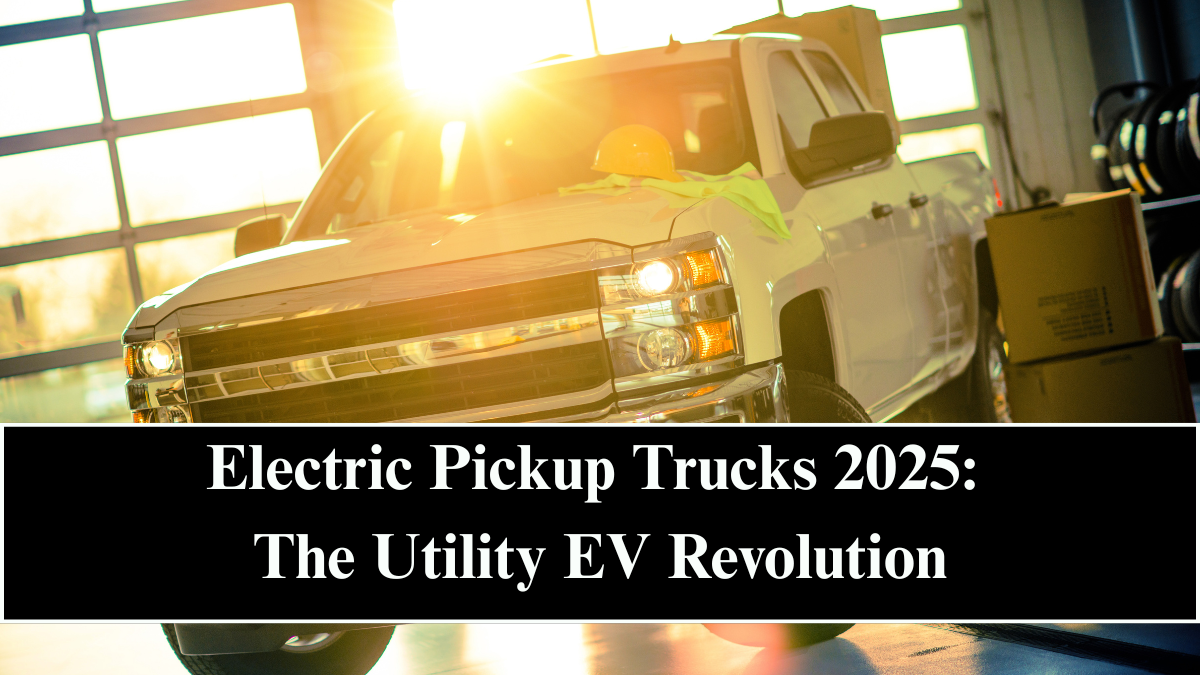In 2025, electric pickup trucks have become a defining force in the global shift toward sustainable transportation. What began as a niche market driven by innovation and curiosity has now transformed into a booming segment led by some of the world’s biggest automakers. These new-age trucks deliver massive torque, long range, and zero emissions, proving that green technology can be as tough and capable as traditional diesel-powered workhorses.
With rapid advancements in battery efficiency, charging infrastructure, and smart connectivity, electric pickups are now a mainstream reality—bridging the gap between utility, performance, and environmental responsibility.

The Rise of the Electric Pickup Segment
Once considered unsuitable for electrification due to size and power demands, pickup trucks are now leading the EV revolution. The turning point came when major brands demonstrated that EV technology could meet and even exceed the rugged performance standards expected from trucks.
By 2025, global electric pickup sales have surged over 400% since 2022, driven by rising fuel costs, government incentives, and consumer interest in sustainable mobility. The segment is now attracting both commercial users and adventure enthusiasts looking for high-torque performance with zero tailpipe emissions.
Leading Electric Pickup Models in 2025
Several powerful and technologically advanced electric pickup trucks have entered the market in 2025, offering incredible range, payload, and off-road ability:
-
Tesla Cybertruck: Known for its futuristic design and stainless-steel exoskeleton, it delivers over 500 miles of range and record-breaking acceleration.
-
Ford F-150 Lightning: The best-selling truck in the U.S. has gone electric, combining Ford’s heritage with cutting-edge EV power and V2H (Vehicle-to-Home) energy backup.
-
Rivian R1T: A pioneer in electric adventure trucks, featuring quad-motor AWD, air suspension, and outdoor utility features.
-
Chevrolet Silverado EV: Offers 400+ miles of range, rapid charging, and superior towing capabilities for both urban and commercial users.
-
RAM 1500 REV: Introduced in 2025 with dual-motor systems and powerful off-road features, designed for performance and endurance.
These models highlight how electric pickups are not only powerful and practical—but also redefining luxury and technology in the automotive industry.
Performance and Power Redefined
The hallmark of electric pickup trucks in 2025 is instant torque and impressive power output. Advanced EV powertrains provide acceleration and pulling strength previously unimaginable for trucks.
Key performance metrics:
-
Torque: Up to 1,000 Nm in dual or quad motor setups.
-
Acceleration: 0–100 km/h in under 4 seconds for top models.
-
Range: 400–800 km on a single charge depending on configuration.
-
Towing capacity: Exceeding 10,000 pounds in heavy-duty variants.
Unlike traditional pickups, electric versions deliver smooth, vibration-free performance while maintaining durability across rough terrains.
Advanced Battery and Charging Technology
The 2025 generation of electric trucks relies on solid-state and high-density lithium-ion batteries with exceptional longevity and fast-charging capabilities.
Highlights include:
-
800V architecture allowing 80% charge in just 20 minutes.
-
Battery cooling and thermal management systems for extended life.
-
Modular battery packs to customize range and performance.
-
Integration with solar and smart home systems for sustainable energy use.
With the growth of nationwide ultra-fast charging networks, drivers can now confidently use electric trucks for long-haul travel and heavy-duty work without worrying about range or downtime.
Smart Features and Connectivity
Today’s electric pickup trucks go far beyond brute strength—they’re tech-powered ecosystems on wheels. Built-in AI systems, smart dashboards, and real-time analytics make them intelligent companions for both work and leisure.
Top innovations include:
-
Over-the-air (OTA) software updates for performance enhancements.
-
AI-assisted navigation optimizing routes and charging stops.
-
V2G and V2H compatibility enabling energy export to homes or grids.
-
Advanced driver assistance (ADAS) and autonomous driving capabilities.
-
Digital key access, fleet tracking, and mobile app control for enhanced security.
These features position electric pickups as smarter, safer, and more connected than their gasoline predecessors.
Environmental and Economic Advantages
Electric pickups are not just performance powerhouses—they’re eco-efficient machines contributing to a cleaner planet. They produce zero tailpipe emissions, and with renewable charging, their carbon footprint is drastically lower than internal combustion trucks.
Economic benefits include:
-
Lower maintenance costs (fewer moving parts, no oil changes).
-
Government incentives and rebates for EV purchases.
-
Reduced fuel expenses by up to 70% annually.
-
Longer vehicle lifespan due to robust EV powertrain design.
For commercial fleets, the savings are even greater, making electric pickups an economically and environmentally sustainable investment.
Challenges in the Electric Pickup Market
While progress is rapid, the segment faces a few ongoing challenges in 2025:
-
High upfront cost: Premium pricing still limits accessibility for some buyers.
-
Charging infrastructure gaps: Rural and off-road areas remain underserved.
-
Battery weight: Larger battery packs add weight, reducing payload slightly.
-
Consumer adaptation: Traditional truck owners are slowly transitioning to EVs.
However, as battery costs decline and charging grids expand, these issues are steadily diminishing—opening the door for mass-market adoption.
The Road Ahead: The Future of Utility Vehicles
By 2030, electric pickups are expected to dominate the utility and adventure vehicle markets, accounting for over 40% of global truck sales. Future developments include:
-
Next-gen solid-state batteries with even faster charging.
-
Solar-integrated truck beds for off-grid power generation.
-
Full autonomy for commercial and delivery operations.
-
Ultra-durable lightweight composites reducing vehicle mass.
As sustainability becomes central to automotive design, electric pickup trucks stand at the intersection of strength, technology, and environmental responsibility, representing the very future of utility mobility.
FAQs
What makes electric pickup trucks different from traditional ones?
They use electric motors and batteries instead of engines, offering instant torque, zero emissions, and lower operating costs.
Which are the top electric pickup trucks in 2025?
Tesla Cybertruck, Ford F-150 Lightning, Rivian R1T, Chevrolet Silverado EV, and RAM 1500 REV lead the global market.
How long do electric pickup batteries last?
Most batteries last 8–12 years or up to 500,000 km, with minimal degradation.
Are electric pickups suitable for heavy-duty work?
Yes, 2025 models offer 10,000+ pounds towing capacity and are ideal for commercial and off-road use.
What’s the future of electric pickups?
They will continue evolving with solid-state batteries, AI integration, and solar charging, becoming the standard for sustainable transportation.
Click here to know more.
